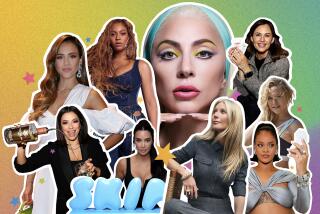Column: Mnuchin’s wife isn’t the only one defining herself through the brands she promotes
- Share via
Treasury Secretary Steven T. Mnuchin’s wife, Louise Linton, did herself no favors when she took to Instagram this week to brag about the luxury brands she was wearing and then belittled a commenter who called her out for her let-them-eat-cake behavior.
“It’s as stupid as stupid gets,” said Leslie Goldgehn, a professor of marketing at the University of San Francisco.
But I’m not here to join the chorus of critics who have made Linton the poster girl for crass, tone-deaf displays of wealth and thoughtlessness. I have another question in mind.
Why do people do this?
I don’t mean why people behave so atrociously. I mean: Why do consumers — even those in the pampered One Percent Club — so eagerly embrace corporate brands and make them their own?
It’s not a new phenomenon, of course. Consumers have been associating themselves with favorite brands for decades — logos on T-shirts or sneakers, designer goods that all but scream the designer’s name.
What’s changed is the way social media platforms such as Instagram and Facebook have taken things to a higher level, making brand identification more powerful, more tempting and potentially more dangerous.
“Social media is amplifying and accelerating the phenomenon,” said Americus Reed, a marketing professor at the University of Pennsylvania’s Wharton School. “It’s where we curate an idealized version of ourselves.”
And then we broadcast it to the world.
Linton, 36, a Scottish actress and producer who became the third wife of 54-year-old Mnuchin in June, certainly wasn’t shy about putting herself on display.
She posted a photo on Instagram of her and her husband disembarking from a government jet in Kentucky, where the pair planned to visit Ft. Knox. Some say they actually were using taxpayer funds to get a good seat for the eclipse.
To make sure her stylish ensemble received due notice, she hashtagged her post, “#roulandmouret pants, #tomford sunnies, #hermesscarf, #valentinorockstudheels #valentino.” Fashion mavens estimated she was not-so-humble bragging about thousands of dollars’ worth of goodies.
Then, after another Instagram user commented, “Glad we could pay for your little getaway #deplorable,” Linton went into full Marie Antoinette mode.
“Have you given more to the economy than me and my husband?” she snapped online. “Either as an individual earner in taxes OR in self-sacrifice to your country? I’m pretty sure we paid more in taxes toward our day ‘trip’ than you did. Pretty sure the amount we sacrifice per year is a lot more than you’d be willing to sacrifice if the choice was yours.”
She signed off with: “You’re adorably out of touch.”
Linton subsequently apologized, saying through a publicist that her original post and response were “inappropriate and highly insensitive.”
That they were. But her in-your-face hashtags were in keeping with a consumer culture that has grown increasingly assertive in declaring corporate allegiances.
The Internet is now populated with “influencers” and “tastemakers” — and more than a few wannabes — who dedicate themselves to pimping popular brands. In return, many receive swag, and maybe some cash, from the companies they promote.
The Kardashians and Jenners are at or near the top of this food chain, but there’s no shortage of others who have made materialism both a lifestyle and a livelihood. Today, more than ever, people are defining themselves through the brands they promote.
The pay-for-play nature of the game has become so routine that the Treasury Department had to issue a statement this week saying that Linton “does not receive compensation for products she mentions.”
So why do it?
“She was clearly borrowing from the equity of those brands and depositing it in her own piggy bank,” said Jon Cohen, general manager of Innovation Protocol, a Los Angeles branding firm. “Those hashtags were shorthand for ‘I have power’ and ‘I have privilege.’”
That’s a way more aggressive stance than, say, flashing designer logos around the country club.
“What was different here was perhaps a lack of recognition that she was no longer communicating with her circle of friends but rather the public at large,” said Ravi Dhar, director of the Center for Customer Insights at the Yale School of Management.
“What might be harmless bragging with a smaller circle is now seen by the public at large and comes across as arrogance,” he said.
For most consumers, brand identification is what’s known in marketing circles as “aspirational” — it’s an expression of who you’d like to be. Maybe you don’t drive a BMW, but wearing a BMW hat is the next best thing.
For the well-to-do, especially someone in Linton’s position, there’s no need for aspiration; you’re already there. Such people tend to broadcast their status by dialing back ostentatious displays of fashion and maintaining a lower profile.
Mnuchin, a former Goldman Sachs banker, is estimated by Forbes to be worth $300 million.
“Flaunting brands is not something that the incredibly wealthy do,” said Tim Calkins, a marketing professor at the Kellogg School of Management. “It’s something the merely prosperous do.”
However, he noted that Linton’s Instagram posts reflected the goes-to-11 nature of being a social media standout. If you want attention, you have to do things bigger and bolder, bad taste be damned.
“Subtlety doesn’t play well on social media,” Calkins said.
Kristin Diehl, an associate professor of marketing at USC’s Marshall School of Business, said Linton also demonstrated the emerging trend of signaling status not just through brands but also through unique experiences.
Her initial Instagram post appeared staged because someone had to get on the tarmac, outside the plane, to photograph Linton and Mnuchin emerging into the bright Kentucky sunshine.
Before the hashtags for all the high-end brands, Linton posted: “Great #daytrip to #Kentucky! #nicest #people #beautiful #countryside.”
Which is to say, #I’mCool.
Which is to say this is about as uncool as a person can get.
“She was trying to say, ‘I’m a high-class chick. This is who I am,’” said Goldgehn of the University of San Francisco. “But if you’re really a high-class chick, you don’t need to show it.”
#True
David Lazarus’ column runs Tuesdays and Fridays. He also can be seen daily on KTLA-TV Channel 5 and followed on Twitter @Davidlaz. Send your tips or feedback to [email protected].
MORE CONSUMER CONFIDENTIAL
How to get a star on the Hollywood Walk of Fame? Talent — and cash
It shouldn’t take generous strangers to help patients cope with drug prices







